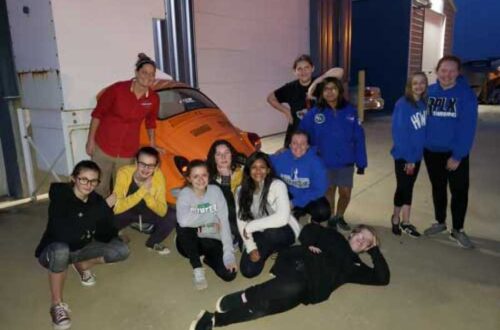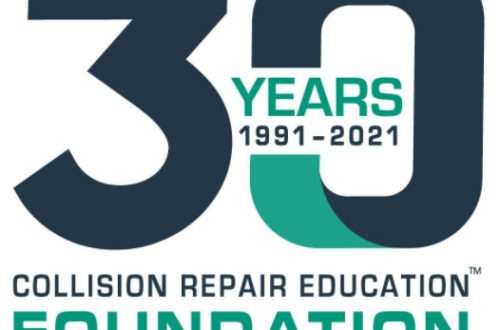Collision Career Institute Addresses Technician Shortage
Wednesday, 26 September 2018 18:17
Featured in AUTOBODYNEWS

As the technician shortage continues to plague the collision repair industry, the topic of attracting new blood to shops has become common at events and in facilities across the country.
However, once someone new is sold on collision repair, the next concern is ensuring they receive the proper training to successfully begin a career in the industry.
The Collision Career Institute (CCI) has developed a means of addressing this dilemma.
According to Chief Operations Officer Amber Ritter, “CCI is an apprenticeship program that consists of 3,000 on-the-job training hours plus 250 related supplemental knowledge hours. Our role is to help recruit, manage and track the skill sets of students while helping trainers offer the best knowledge by providing an outlined curriculum.
“In addition to facing the challenges of aging techs and a shortage of good employees, it’s important to acknowledge that this is also a difficult industry to train in. Shops are focused on KPIs, speed and cycle time, so it can be difficult to slow down enough to focus on the transfer of skills and knowledge. That can cause potential talent to slip through the cracks.”
Ritter explained that many folks interested in a collision repair career are uncertain about how to get started.
“Those who start training may get frustrated without a clear pathway,” she said. “They can’t see how they’ll actually become a painter or estimator while they’re sweeping floors or answering phones. CCI aims to give them a path and a structured way to get there.”
CCI’s apprenticeship program begins with an eight-week boot camp followed by 12 to 16 months of training and offers three tracks: painter, body tech and repair planner, each containing six specific modules. During boot camp, students get familiar with the track to ensure it’s a good fit by meeting with instructors weekly and engaging in I-CAR training, knowledge-based learning and skills-based assignments in the shops.
Ritter explained, “We work with the shop and trainers to provide a list of tasks the apprentice should be trained on first to create free space in the trainer’s day for the training and so the apprentices are a benefit to their trainer.”
Zach Serhal of Fix Auto is currently training two students in the shop he manages. Although he originally struggled with gaining the comfort to delegate some of his responsibilities to his apprentices, Serhal said the apprentices have been a major benefit to the shop.
“They provide extra help through each phase of their program, which alleviates time on the trainer,” he said. “They bring a fresh mind to the table for ideas and are given responsibilities, which helps everyone in the shop. The apprentices ‘ramp up’ very quickly. This added help and quick ramp-up time increases the production flow in the shop. With respects to the repair planner portion, we have experienced greatly improved cycle time, increases in profitability and reduced supplement ratio.
“CCI’s program can be life-changing. To be able to get into a field with zero experience and within two years be making a very good, livable salary really says something. The students are vetted, engaged and hungry to learn and grow within their field. Most importantly, they are committed and passionate about their journey and outcome. I am very proud of my apprentices, what they have accomplished and how much they have grown.”
Alison Penberthy is currently an apprentice in CCI’s program and working on the fourth module in the repair planner track.
She shared, “Prior to working in the collision industry, I worked with my husband, Brian, and helped him run our auto glass business for a little over nine years. During that time, I was exposed to the collision industry every day, and I watched the way different shops operated and how each position contributed to the process of repairing the vehicle. It was interesting how the whole process came together to reveal the final product. I wanted to be a part of a process like that.”
When her husband informed her that a local shop was hiring for a parts coordinator, Penberthy filled out an application and began her new job three weeks later. After three years as a parts coordinator at Fix Auto Yorba Linda,she knew she wanted to become a repair planner. When she expressed that desire to upper management, they suggested she would be a great fit for CCI.
“At that point, I had no idea there was actually a school out there that was specifically designed to help me reach my goal of becoming a repair planner,” she said.
CCI’s application process is available to any high school graduate who can pass standard employment guidelines. Upon applying, the potential student goes through a series of tests and interviews, and if successful, will tour a shop and talk to someone in their chosen position to ensure it’s the path they want to take.
Ritter explained, “We send several applicants to interview with management at the shop location, and if the shop doesn’t choose a certain apprentice, we keep them in the applicant pool until we can connect them with a shop that’s a good match.”
CCI ensures the trainers know which tasks to teach apprentices first, providing a progression of tasks they can help with and when to introduce skills. Once everyone involved feels the student is ready, the apprentice is tested by a third-party evaluator to ensure they’re capable of completing the learned tasks.
Penberthy shared, “The application process started with a Berke Assessment. Once I completed the assessment and received the results, I was told I would make a great fit for the program. I completed the necessary paperwork and was given a launch date. I met with my coordinator, my instructor and my trainer, and I was given a rundown on the program structure and what to expect on a day-to-day basis. A portion of the training we receive is through I-CAR, which is a great addition to the in-shop training; they work hand-in-hand with what we are focusing on for that particular module.
“CCI’s program is preparing me for my career in the collision industry. The program allows me a safe, neutral zone to learn and grow from my mistakes. It provides a solid foundation of knowledge and experience from some of the best in our industry. Not only are you exposed to the experience and knowledge of our instructor Charlie Robertson, who is the encyclopedia of collision repair, but you’re also paired with an in-shop trainer. My current trainer, Jason Lake, has been in the industry for 20 years. Having the opportunity to work with and learn from these individuals cements the whole process. CCI is changing my life! I love this industry and all it has to offer!”
Serhal agrees that CCI’s program is hugely beneficial to the industry.
“Programs like CCI provide a huge benefit to the industry’s future. CCI brings awareness to an industry that not many think about as a career option,” Serhal said. “Their program is accelerated, thorough and up-to-date with the contact changes our industry experiences in repair methodology and requirements. Most importantly, they are providing our industry with the qualified workforce of tomorrow.”
CCI was officially launched in 2016 and was founded by Erick Bickett, Shelly Bickett and Charlie Robertson. Any shop with Wi-Fi can sign up for the program, but, Ritter stressed, the shop also “has to commit to the training process, be able to provide a trainer and most importantly, commit to train in a structured environment that allows the apprentice to move through the skills.”
Both Serhal and Penberthy agree that the program is great for the industry, and they encourage others to get involved with CCI as trainers and students.
Serhal stated, “I would recommend other shops get involved with CCI and get involved right now. Many of today’s technicians will soon be retiring, and we can no longer wait to ‘cross that bridge when it comes.’ The time is now to get the next generation in the shops learning, growing and gaining the skills necessary to keep your business moving forward.”
Penberthy added, “I would highly recommend this program to those who are interested in the collision repair industry. I love the way the program is designed. It walks you through each step, revealing more of the big picture through each module and giving you time to grasp each concept as you progress one at a time. It’s a great learning environment with hands-on experience. I would tell anyone who is applying for CCI to give it all you have. Be open-minded, listen with your eyes and ears, ask questions, believe in yourself and grow!”
Ritter urges interested shops to contact CCI and become trainers.
“You’re changing the culture of the industry,” she said. “This is how we get more people involved in collision repair, and this is how you become known as a shop that grows your own people.”
For more information about CCI, visit collisioncareerinstitute.com.


